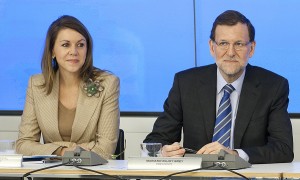
“I didn’t get into politics because I wanted applause or money … I got into politics because I wanted to change things.” So said Prime Minister Mariano Rajoy on Saturday as he gave his first proper public response to allegations published by El País that he was among many politicians who took under-the-table payments from a longstanding Partido Popular (PP) slush fund.
But it doesn’t take a cynic to observe that very little has changed during Rajoy’s first year of government, despite his fighting talk at the weekend.
As if to remind us of the fact, today he travels to Germany to meet Angela Merkel and discuss yet again the woes of the Spanish economy, on the same day that new unemployment figures show a labour market that is still in freefall.
But in light of recent events, the pressure is now on Rajoy to change not just the fortunes of the economy, but to do something about corruption – not least of all in his own party.
If you believe El País’s claims, Rajoy and the party broke the law in a systematic and shameless way and the former treasurer Luis Bárcenas enjoyed an amnesty for tax dodgers introduced by the PP itself.
The Bárcenas scandal only broke in mid-January and yet events have moved so fast that already the affair seems to have passed the point at which Rajoy’s firm but essentially empty statement on Saturday will serve any purpose. A Metroscopia poll published on Sunday showed 76 percent of Spaniards do not believe the PP’s denial of the existence of the illegal fund. Perhaps even more alarming for the government, among the PP’s own voters 58 percent were unconvinced. The same poll showed the PP shipping support. Its voter intention is now 20 points below where it was when Rajoy was voted into power.
It is not just El País that is leading with this story every day, with new, damaging revelations coming thick and fast. The supposedly pro-PP El Mundo is also pursuing it with vigour. With the exception of some of the more deliriously right-wing media, Bárcenas-gate is dominating the news agenda.
The pressure builds and builds and yet all we get from Rajoy is a defensive denial, vague claims of a plot to bring his party down and a refusal to answer reporters’ questions. His decision to commission an internal probe to ascertain whether there was any wrongdoing sounded farcically like what it was: the party investigating itself.
Communication has been one of the glaring weaknesses of this administration and this scandal seems to be underscoring the fact. But paranoia, defensiveness and faux-transparency will not wash this time and as the scandal continues, Spain will pay the price.
Accepting the national problem
As the signatures on an online petition calling for the resignation of the PP top brass approach the one million mark, protesters gather daily outside the party headquarters in Madrid, the leader of the opposition calls for Rajoy’s resignation and analysts worry about the economic implications of the scandal. Given the circumstances, it’s hard to believe that, as he meets with Merkel, Rajoy’s mind will be entirely on the issue at hand.
One of the more irritating aspects of his Saturday statement, and the appearance by PP deputy leader María Dolores de Cospedal last week, was their apparent refusal to accept that corruption is a national problem of titanic proportions. An acknowledgement that this is the case, that dishonesty blights Spain’s politics and hinders its economy, would be a start.
And it goes without saying that a serious parliamentary investigation into what exactly went on between 1990 and 2008 in the PP headquarters is essential – not just to get to the bottom of the issue, but to restore at least a smidgeon of faith in Spain’s increasingly battered institutions.
But the longer Rajoy and his party fail to dispel the doubts, the more bogged down the government will get. Spain’s prime minister may have got into politics “to change things”, but only a year after finding himself in a position to do just that, his credibility is seeping away at an alarming rate.
Vested interests prevent Spain making its political system more transparent and accountable. Maybe international loss of confidence will eventually force Rajoy from office and bring this long standing problem to the boil.
We can begin to quantify the cost looking at the latest bond auction – the yield is up around 0.3% on 4.6 billion euros, meaning an additional finance cost of around 100 million per year, just on this tranche. Another 80% of the bonds required to finance 2013 are yet to be auctioned, around 220 billion, so we could expect around a billion euros per year in extra finance costs caused by the instability of the Bárcenas allegations.